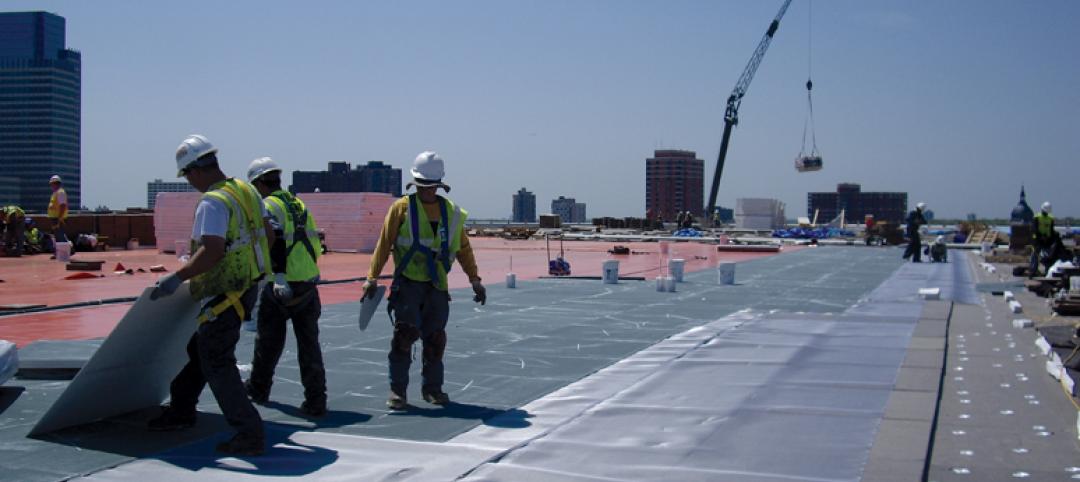The hearing over what to do with the unfinished Harmon Hotel began earlier this week with a legal nod toward Las Vegas' penchant for spectacular implosions.
Attorneys for a couple of the contractors on the project in the CityCenter complex argued for letting it stand at least until a broader trial over construction defects and determining financial responsibility begins in February. Anything less would make a fair hearing impossible, they said.
"If this building (Harmon) falls, it will travel around the world," said Jeffery Garofalo, representing Ceco Concrete Construction, referring to the expected news coverage. "It may poison the jury pool and be highly prejudicial" because so many people would associate the Harmon with horrible contractor performance.
But MGM Resorts International Inc., the half-owner and developer of the $8.5 billion CityCenter, argued public safety must come first. Nearly a year ago, the Clark County Building Division raised concerns that numerous building code defects could cause the 26-floor building to collapse in an earthquake. Last August, a CityCenter study concluded that demolition made more sense than repair.
"We're here in this courtroom today, about four years after the first safety-threatening violations were discovered," CityCenter attorney Steve Morris said. "Since then, nothing has been done."
Contractors have scheduled their own expert witnesses, who are expected to say computer modeling that prompted earthquake concerns was riddled with flaws. Perini Building Co. Inc., the general contractor, has offered in the past to repair the Harmon as the best solution. The hearing is expected to continue through Thursday.
Contractors want to preserve the Harmon as possibly the world's largest trial exhibit so they can conduct physical tests to rebut allegations of pervasive shoddy workmanship. CityCenter has so far provided raw data about mistakes, but not a final list that would explain the problems. Until then, the contractors say, they don't know exactly which tests to conduct.
The court-imposed deadline for what is called destructive testing, where small sections of the building are demolished to view the underlying work, has already passed. Morris contended that the contractors already had ample opportunity to gather any evidence they needed.
Morris also tried to dispel the idea that MGM Resorts had used its political muscle to prod the county into taking its side.
"There aren't any secrets here," he said. "There aren't any smoke-filled back rooms where conspiracies are being developed."
He said that the demolition bill would run about $30 million. Nearly $280 million was spent on the Harmon's never-finished construction.
The larger issue underlying the sprawling case, which brought more than two dozen attorneys to the courtroom of Clark County District Court Judge Elizabeth Gonzalez, involves whether Perini should be paid its approximately $500 million fee or whether CityCenter is owed damages for a job poorly done.
The testimony began with CityCenter consulting engineer Chukwuma Ekwueme methodically showing photo after photo of parts of the Harmon, where he and his team had chipped away the concrete pillars and beams to examine the steel reinforcing bars inside. Through dozens of examples, he pointed out construction errors such as missing or poorly spaced bars, which could contribute to structural failure.
His work involved taking more than 10,000 photographs and writing out 1,000 pages of field notes, he said. BD+C
Related Stories
| Feb 15, 2011
Iconic TWA terminal may reopen as a boutique hotel
The Port Authority of New York and New Jersey hopes to squeeze a hotel with about 150 rooms in the space between the old TWA terminal and the new JetBlue building. The old TWA terminal would serve as an entry to the hotel and hotel lobby, which would also contain restaurants and shops.
| Feb 15, 2011
New Orleans' rebuilt public housing architecture gets mixed reviews
The architecture of New Orleans’ new public housing is awash with optimism about how urban-design will improve residents' lives—but the changes are based on the idealism of an earlier era that’s being erased and revised.
| Feb 15, 2011
LAUSD commissions innovative prefab prototypes for future building
The LA Unified School District, under the leadership of a new facilities director, reversed course regarding prototypes for its new schools and engaged architects to create compelling kit-of-parts schemes that are largely prefabricated.
| Feb 15, 2011
New 2030 Challenge to include carbon footprint of building materials and products
Architecture 2030 has just broadened the scope of its 2030 Challenge, issuing an additional challenge regarding the climate impact of building products. The 2030 Challenge for Products aims to reduce the embodied carbon (meaning the carbon emissions equivalent) of building products 50% by 2030.
| Feb 15, 2011
New Urbanist Andrés Duany: We need a LEED Brown rating
Andrés Duany advocates a "LEED Brown" rating that would give contractors credit for using traditional but low cost measures that are not easy to quantify or certify. He described these steps as "the original green," and "what we did when we didn't have money." Ostensibly, LEED Brown would be in addition to the current Silver, Gold and Platinum ratings.
| Feb 15, 2011
AIA on President Obama's proposed $1 billion investment in energy conservation
The President’s budget increases the value of investment in energy conservation in commercial buildings by roughly $1 billion, reports AIA 2011 President Clark Manus, FAIA. The significant increase from the current tax deduction of $1.80 per sq. ft. now on the books is an increase for which the AIA has been advocating in order to encourage energy conservation.
| Feb 14, 2011
Sustainable Roofing: A Whole-Building Approach
According to sustainability experts, the first step toward designing an energy-efficient roofing system is to see roof materials and systems as an integral component of the enclosure and the building as a whole. Earn 1.0 AIA/CES learning units by studying this article and successfully completing the online exam.
| Feb 11, 2011
Four Products That Stand Up to Hurricanes
What do a panelized wall system, a newly developed roof hatch, spray polyurethane foam, and a custom-made curtain wall have in common? They’ve been extensively researched and tested for their ability to take abuse from the likes of Hurricane Katrina.













